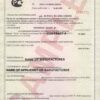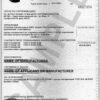Type of Certification Renewal
Type Of Industry Manufacturing
Type Of Service Provider Consulting Firm
Nowadays the GOST R certification system is undergoing significant changes. The idea behind is to collapse the hundreds of GOST standards, which, dating back to the Soviet Union, still serve as reference documents in GOST R certification system, to a small number of the so-called Technical Regulations (TR). Each TR encompasses a wide array of goods. Certificates of Conformity to TR will be issued for all the products covered by TRs (an equivalent of the EU Directives) to replace GOST R certification. A Certificate of Conformity is a document that certifies that a product meets all the regulatory requirements and can circulate without restriction anywhere within the Customs Union. The requirements to be complied with are set out in the TR.
A Certificate of Conformity (CoC) is a document issued by a regulatory or certification authority that confirms a product meets the required standards or specifications. CTR (Conformity Test Report) is often closely related to a CoC, as it provides the test results and data that demonstrate the product’s compliance with specific standards.
Here’s a breakdown of what a Certificate of Conformity (CoC) typically includes:
1. **Product Information**: Details about the product, such as model number, serial number, and description.
2. **Standards and Regulations**: Lists the specific standards, regulations, or directives that the product complies with.
3. **Test Results**: Summarizes the results of tests conducted to demonstrate compliance with the relevant standards. This may include performance tests, safety tests, environmental tests, etc.
4. **Issuing Authority**: Information about the organization or agency that issued the CoC, including contact details and accreditation status.
5. **Validity Period**: Specifies the period for which the CoC is valid. Some certificates may have an expiration date and require renewal.
6. **Signature and Seal**: An official signature and seal from the issuing authority to authenticate the document.
Manufacturers often obtain a CoC or CTR to demonstrate that their products meet the regulatory requirements of the market they are targeting. This can be essential for gaining market access, ensuring consumer safety, and avoiding potential legal issues related to non-compliance.
If you’re in the process of obtaining a CoC or CTR, it’s crucial to work with accredited testing laboratories and certification bodies to ensure that your product meets all the necessary requirements.











Reviews
There are no reviews yet.